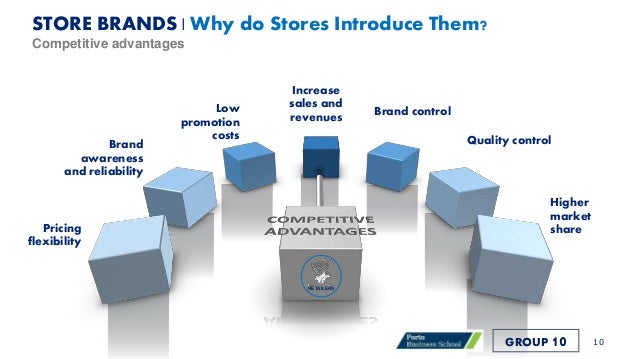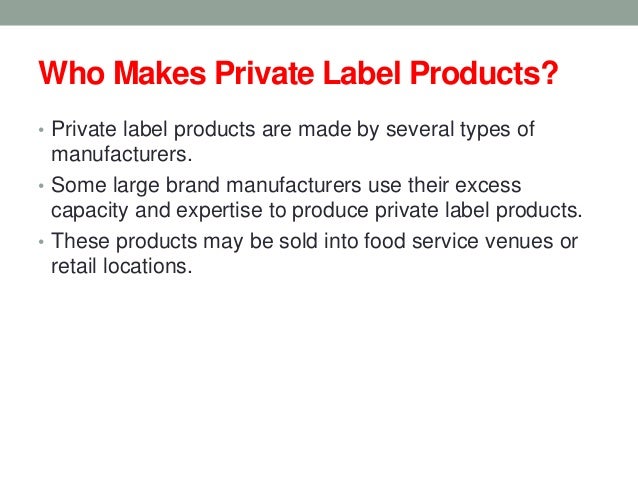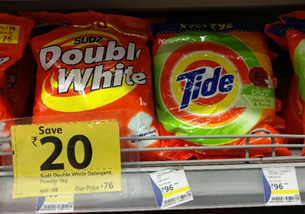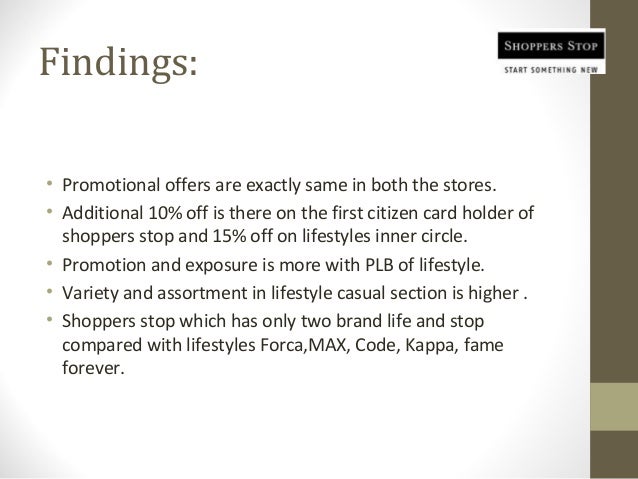38 role of private labels in retail
retailing-private label - SlideShare • Private Labels are Retailers own, control, and exclusively sell store brands • Private Label are a 'Good Alternative' to Other Brands, Offering the Same Quality & Value • Private labels are regarded as good Value for Money, and Quality on Par with the Big Brands. 3. Turning private labels into powerhouse brands - McKinsey Even as retailers have introduced new private-label products and brands over the years, few have thought through the role of private labels in their businesses. Some private-label brands and products come into being simply because, for instance, a vendor offers to make a product at a lower cost and higher margin rate than a national brand.
The Role of Private Brands and the Retail Planning Process In implementing the private label strategy, retailers must carefully consider the pricing/positioning structure and figure out an appropriate tiered pricing model, so that NBEs, e.g., do not cannibalize or directly compete with the sales of valued private brands while at the same time undoing with the high-quality perception of NBEs.

Role of private labels in retail
The Strategic Role of Private Labels on Retail Competition Unlike other strategic variables to reduce. competition, we believe that private labels provide two benefits to thwart competition. First, private labels are unique to the retailer and therefore ... Private labels - SlideShare private labels & innovations it is more important for private labels to innovate and customize to stay in the market and retain margins imperative to find out the customers needs and then create wants and desires based on those needs an advantage - retailers know their customer base better than branded companies and can develop products … What is Private Labeling? [Definition, Pros, Cons & More] As a retailer, you have control over every part of your private label line. You can define the ingredients or components. You can control things down to the color and shape of the product. You control how the product is branded and marketed, too. When you sell branded products, people aren't becoming loyal to your company.
Role of private labels in retail. Private Label Brands Roar At Retail - Forbes Overall, private labeling is a positive trend, although, as with everything, there will be winners and losers. It helps manufacturers who need capacity, creates loyalty for retailers who can get... The role of private label tiers and private label naming strategies in ... The evolution of private labels (PL) is a recent trend in the retail industry: many retailers now manage a PL portfolio that includes multiple value propositions, as well as various brand name strategies. Little research has been done, however, on how this combination of PL strategies conditions the results of the retailer that manages them. Private Label : Definition, Example, Pros & Cons - Retail Dogma Private label is a concept in retailing, where a retailer contracts a third-party manufacturer to manufacture their products under certain specifications, and under a brand name that belongs to the retailer. A lot of retailers who sell multi-branded products in their store sometimes opt to private label part of their product offering to realize ... Is Private Label Merchandise Right for Your Retail Store? If you are a retailer who matches prices, private-labeled goods provide a great benefit. In many cases, you can get your supplier to make you the same product, but without their label on it. Then you can still charge full price for your product when your competition puts the branded version on sale.
Private Label is a Winning Strategy for Retail Success The reason lies in the fact that private label products are exclusively available in the store that produces them. Agility to respond to trends - Agility relates to fast response and flexibility. Since retailers have greater control over their brands, they can innovate and change faster. Private Label Brands Surge As Consumers Purge Closets - Forbes Private labeling was already a staple of big-box retailers before the pandemic, for retail giants like Walmart and Target, and for major niche players. In 2018, Urban Outfitters reported that over... Private labeling: Process, Advantages, and Disadvantages Following are the few things that you should keep in mind while designing a private labeled product #1 Price and customer loyalty: It is important to make sure that the products that you are private labeling are profitable for you. Otherwise, it would be better for you to invest in buying the products of some well-established brand to avoid loss. Private Label Packaging Playing an Essential Role in Retailer Brand ... Retailers continue to refine their private label strategies, with packaging playing an essential role. The latest package designs put the "brand" in store brands, with smart looks that convey differentiated quality. And in some cases, the packaging also offers environmental benefits. Changes in the retail environment, supply chain and consumer ...
4 Benefits of Private Labeling for Your Brand - Century Label Private label products use the retailer's private label brand. It is up to the end retailer to design the manufacturing, packaging, and marketing - not up to you as the creator of the good, eliminating added costs. You only pay the product cost without a premium for brand name or expensive marketing campaigns. Lower Operating Costs Private labels and the specific retailer's role - IDEAS/RePEc Private labels (or own-brand products) play a prominent role for consumers in their perception of retailers' reputation. In a model where products are experience goods, a retailer has the opportunity to introduce his own store brand, or to sell a branded product. Private Labeling in Retail: How It Works, Pros and Cons - Dor Private label - Wikipedia A private label, also called a private brand or private-label brand, is a brand owned by a company, offered by that company alongside and competing with brands from other businesses. A private-label brand is almost always offered exclusively by the firm that owns it, although in rare instances the brand is licensed to another company.
The future of Private Brands and its Role in Retail Private Label quality continues to improve beyond its sales growth. Retailers & Private Label manufacturers should leverage its strengths
Private labels: The role of manufacturer identification, brand loyalty ... The purpose of this paper is to analyze product, retailer, and individual factors from the private label brand that influence consumers' loyalty and purchase intention; along with the influence of the manufacturer identification on the product package on purchase intention. Design/methodology/approach
Private Labels: Their growing importance in Retailing - ISME Bergès-Sennou et al [2004] cite a survey by LSA/Fournier1 according to which the main reasons retailers develop private labels are: to increase customer loyalty (16%), to improve their positioning (18%), to improvemargins (25%) and to lower prices (33%). Figure 1 Indian retail industry has seen some ups and downs over the past.
What is Private Labeling? [Definition, Pros, Cons & More] As a retailer, you have control over every part of your private label line. You can define the ingredients or components. You can control things down to the color and shape of the product. You control how the product is branded and marketed, too. When you sell branded products, people aren't becoming loyal to your company.
Private labels - SlideShare private labels & innovations it is more important for private labels to innovate and customize to stay in the market and retain margins imperative to find out the customers needs and then create wants and desires based on those needs an advantage - retailers know their customer base better than branded companies and can develop products …
The Strategic Role of Private Labels on Retail Competition Unlike other strategic variables to reduce. competition, we believe that private labels provide two benefits to thwart competition. First, private labels are unique to the retailer and therefore ...












Post a Comment for "38 role of private labels in retail"